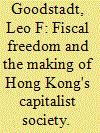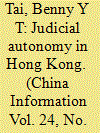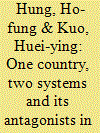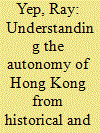|
|
|
Sort Order |
|
|
|
Items / Page
|
|
|
|
|
|
|
| Srl | Item |
| 1 |
ID:
100999


|
|
|
|
|
| Publication |
2010.
|
| Summary/Abstract |
This article examines central-provincial relations in the context of greater centralization. Focusing on the background of provincial leaders, the leadership management system, and the fiscal system, it suggests that there has been an unmistakable trend toward greater central control. However, greater centralization has coexisted with decentralization in many areas of governance. While greater centralization has not completely changed the particularistic character of central- provincial interactions, the arena has shifted to bargaining and lobbying for central largess. Provincial bargaining now occurs in a context in which the central government is in control of considerably greater resources and more capable of setting the rules of the game. This study of the central-provincial relations helps to contextualize the study of Hong Kong's relationship with Beijing first by pointing to their different natures and characters. At the same time, salient developments in central-provincial relations in the main body politics also form the context for Hong Kong's relationship with Beijing.
|
|
|
|
|
|
|
|
|
|
|
|
|
|
|
|
| 2 |
ID:
100996


|
|
|
|
|
| Publication |
2010.
|
| Summary/Abstract |
Fiscal autonomy is a defining principle of China's arrangements for Hong Kong's postcolonial administration and was a major feature of British rule before 1997. This article begins with a discussion of how this colony achieved unusual freedom from London's usual oversight of colonial governments. After rejecting Colonial Office demands for a modern income tax, Hong Kong stuck to the principle of "low tax, small government," defying London's repeated calls for increased public expenditure on social development while resisting local business pressures for subsidies and tax concessions. The analysis then identifies fiscal freedom's contribution to Hong Kong's growth as an international financial center. The discussion explains the link between Hong Kong's unfashionable fiscal conservatism in the 1950s and 1960s and the buildup of government reserves to a level which permitted Hong Kong to control its own monetary affairs, including an independent currency. The final section assesses the gains and losses, both economic and social, which accompanied this fiscal independence. The analysis makes extensive use of unpublished archival material.
|
|
|
|
|
|
|
|
|
|
|
|
|
|
|
|
| 3 |
ID:
100997


|
|
|
|
|
| Publication |
2010.
|
| Summary/Abstract |
To assess the degree of judicial autonomy under an autonomous framework, there are five criteria concerning the courts of the autonomous entity: (1) judicial independence; (2) jurisdiction on purely local matters; (3) the power of final adjudication; (4) the power of final interpretation of its own constitution; and (5) a fair mechanism to resolve disputes arising from conflicts between the exercise of powers by the autonomous entity and the sovereign state. The judicial autonomy of Hong Kong after China resumed to exercise sovereignty over Hong Kong is examined according to these criteria. The substantial differences between Hong Kong's economic, legal, constitutional, and political systems and China's may explain the subtle conflicts that the Hong Kong judiciary has encountered in the last 13 years. The Hong Kong Judiciary has learned that it can only exercise its judicial autonomy in accordance with its sense of constitutional justice inherited mainly from the common law if it can tactfully handle the inherent differences between "one country" and "two systems." However, whether that means a weakened version of judicial autonomy or a strategic way to achieve the highest attainable degree of judicial autonomy within constraints is a matter on which commentators have different opinions.
|
|
|
|
|
|
|
|
|
|
|
|
|
|
|
|
| 4 |
ID:
100998


|
|
|
|
|
| Publication |
2010.
|
| Summary/Abstract |
In turning the vast and diverse territory of the Qing Empire into a singular nation-state, Beijing has kept redefining its conception and institution of nationhood in response to challenges from the recalcitrant or not-yet-incorporated peripheral regions including Tibet, Hong Kong, and Taiwan. Since 1949, Beijing has attempted to solve the Tibet and Taiwan questions with the institutional design of "one country, two systems." This design, widely thought of as a 1980s invention, can in fact be dated back to the early 1950s with respect to Tibet. This design has been far from successful in Tibet and Taiwan. While the "one country, two systems" experiment in Tibet failed with the Lhasa uprising and the flight of the Dalai Lama in 1959, the proposal of "one country, two systems" lost its appeal and had become a taboo among politicians of all strips in Taiwan by the 21st century. In this article, we argue that the success of "one country, two systems" requires a very delicate balance and virtuous interaction between the political center in Beijing and the elite, as well as popular classes, in the periphery concerned. It can easily be jeopardized if the center tilts too much to the left or right.
|
|
|
|
|
|
|
|
|
|
|
|
|
|
|
|
| 5 |
ID:
100995


|
|
|
|
|
| Publication |
2010.
|
| Summary/Abstract |
The so-called "MacLehose era" has been fondly remembered as a period marking the turning point in colonial rule in Hong Kong and its socioeconomic development in the postwar decades. This article, however, argues that it was London's initiatives summarized in the document Hong Kong Planning Paper that accounted for the acceleration of social reforms in the 1970s. Contrary to popular perception, MacLehose, who was beholden to local constraints, appeared to be a reluctant reformer. His inclination to defend his vision of the colony's interests brought him into heated exchanges and debates with British officials who were driven by different political calculations and strategic concerns back home. The altercations uncovered in this article reveal that the colony's perimeter for action is certainly defined by the position of the sovereign; yet, the outcome of the process was hardly preordained. Beneath the facade of subservience and accommodation, colonial administrators had stubbornly defended their vision of local interests and tried to implement the reforms at their own pace. They appeared not to be swayed by the asymmetry of power in constitutional terms.
|
|
|
|
|
|
|
|
|
|
|
|
|
|
|
|
| 6 |
ID:
100994


|
|
|
|
|
| Publication |
2010.
|
| Summary/Abstract |
The exercise of autonomy is a product of the political process of mutual learning by the center and the periphery. Propriety of action and response from both sides is not judged simply on the basis of formal legal permissibility, but is also deciphered with reference to experience in previous encounters. Earlier exchanges and responses to interactions create institutional memory, protocols for action, and limits to legitimate expectations. For both the Hong Kong Special Administrative Region and the central people's government, the new framework, through mutual adjustment and adaptation, is still in the process of being made. Their parallel experience in handling the central and local relationship can serve as a good basis for their exchanges. The articles included in this issue provide comparisons in temporal and spatial terms that are crucial for understanding the autonomy of Hong Kong after 1997. These contributions do not simply reconfirm the disposition of local players to defend and assert their interests vis-a-vis the center; the discussion here also identifies factors shaping the manifestation of autonomy in the case of Hong Kong. Trust, reciprocity, agenda of the sovereign power, and resolution of conflict appear to be significant in shaping the outcome of centre-periphery interaction.
|
|
|
|
|
|
|
|
|
|
|
|
|
|
|
|
|
|
|
|
|